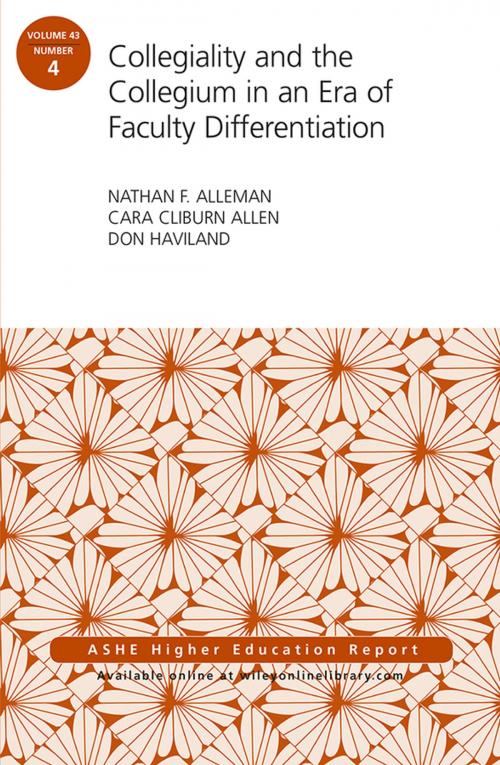Collegiality and the Collegium in an Era of Faculty Differentiation
ASHE Higher Education Report
Nonfiction, Reference & Language, Education & Teaching, Administration| Author: | Nathan F. Alleman, Cara Cliburn Allen, Don Haviland | ISBN: | 9781119467632 |
| Publisher: | Wiley | Publication: | November 14, 2017 |
| Imprint: | Jossey-Bass | Language: | English |
| Author: | Nathan F. Alleman, Cara Cliburn Allen, Don Haviland |
| ISBN: | 9781119467632 |
| Publisher: | Wiley |
| Publication: | November 14, 2017 |
| Imprint: | Jossey-Bass |
| Language: | English |
Dramatic shifts in the demographic and labor diversity of American faculty have pressed institutions and the profession to clarify who the real faculty are, from tenured to adjunct faculty. Efforts to equalize respect, resources, and treatment, although laudable, may be missing a vital aspect of the conversation: the role of collegiality and the collegium.
Collegiality, the cultural, structural, and behavioral components, and the collegium, or the shared identity collegiality serves, are ancient concepts that raise timely questions for the faculty profession:
What is it about the history of the professoriate in America that has rendered the collegium inadequate and yet so important in an age of differentiated labor?
How might a renewed vision for collegiality bring clarity to the question of which faculty should be regarded as experts?
How can we adapt and leverage these important concepts for a professoriate that is increasingly diverse by demographics and employment category in ways that result in a more inclusive and robust profession?
Engaging in these questions through the extant literature will call readers into a compelling new conversation about the needs of and possibilities for the professoriate.
This is the fourth issue of the 43rd volume of the Jossey-Bass series ASHE Higher Education Report. Each monograph is the definitive analysis of a tough higher education issue, based on thorough research of pertinent literature and institutional experiences. Topics are identified by a national survey. Noted practitioners and scholars are then commissioned to write the reports, with experts providing critical reviews of each manuscript before publication.
Dramatic shifts in the demographic and labor diversity of American faculty have pressed institutions and the profession to clarify who the real faculty are, from tenured to adjunct faculty. Efforts to equalize respect, resources, and treatment, although laudable, may be missing a vital aspect of the conversation: the role of collegiality and the collegium.
Collegiality, the cultural, structural, and behavioral components, and the collegium, or the shared identity collegiality serves, are ancient concepts that raise timely questions for the faculty profession:
What is it about the history of the professoriate in America that has rendered the collegium inadequate and yet so important in an age of differentiated labor?
How might a renewed vision for collegiality bring clarity to the question of which faculty should be regarded as experts?
How can we adapt and leverage these important concepts for a professoriate that is increasingly diverse by demographics and employment category in ways that result in a more inclusive and robust profession?
Engaging in these questions through the extant literature will call readers into a compelling new conversation about the needs of and possibilities for the professoriate.
This is the fourth issue of the 43rd volume of the Jossey-Bass series ASHE Higher Education Report. Each monograph is the definitive analysis of a tough higher education issue, based on thorough research of pertinent literature and institutional experiences. Topics are identified by a national survey. Noted practitioners and scholars are then commissioned to write the reports, with experts providing critical reviews of each manuscript before publication.















